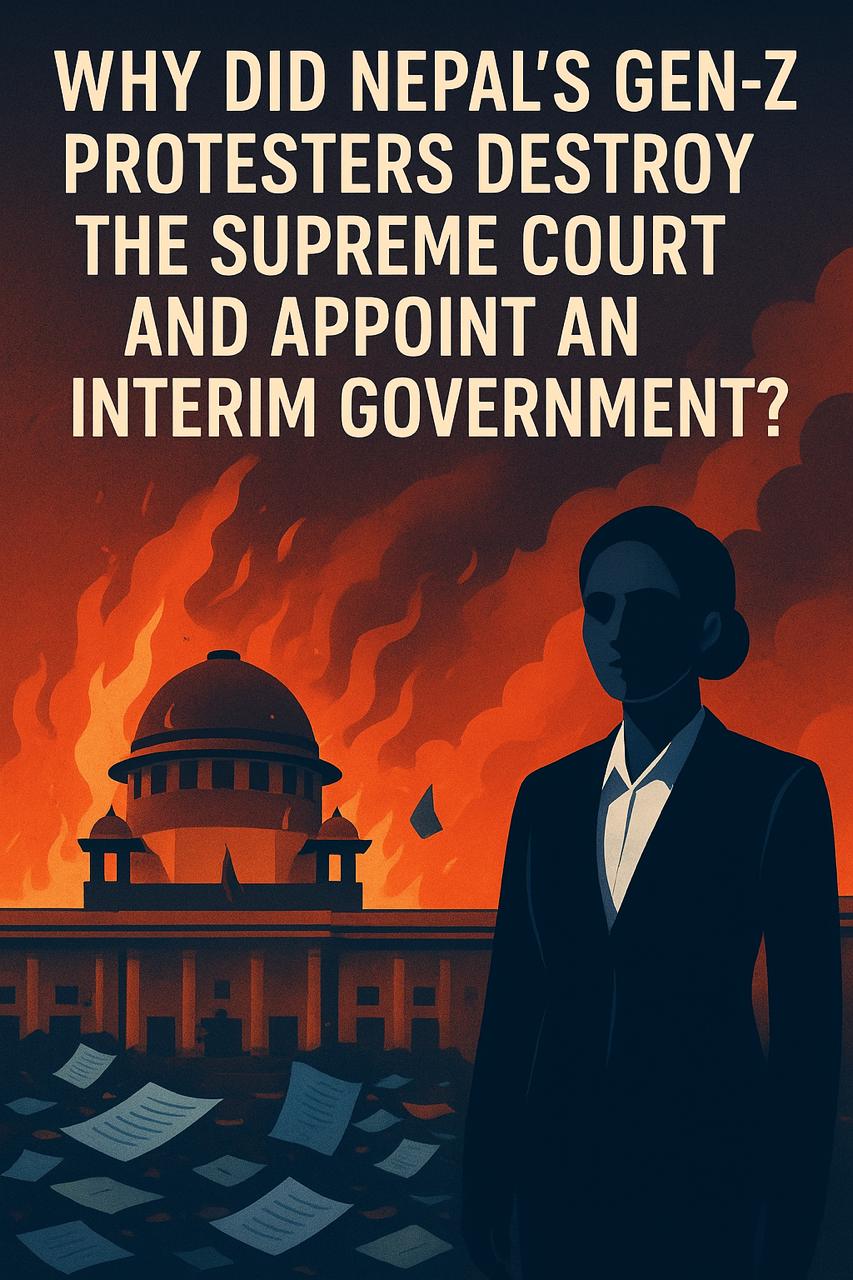Introduction: Nepal in Flames and the Boiling Point of Young Rage
It only takes so much before a nation’s repressed anger bursts into open flame. In late August 2025, Nepal found itself swept by an uprising led not by wary activists or veteran trade unionists but by its own Gen-Z, disillusioned and digitally savvy. What started as fury over a social media ban has now left Kathmandu’s Supreme Court in smoldering ruins, old politics in shreds, and, in a twist few could predict, former Chief Justice Sushila Karki suddenly thrust into the role of interim national leader. Nepal in flames is both a literal and metaphorical tale: of records lost, futures gambled, and a generation refusing to be written off.
Supreme Court Destroyed: Nepal in Flames and the Collapse of Memory
August 30th wasn’t meant to go down in judicial history, but it did. A mob bigger, louder, younger than anyone expected stormed the Supreme Court, torching decades’ worth of case files, data servers, even the ceremonial Shree Yantra symbolizing justice. “We are supposed to decide cases by looking at documents and evidence, but nothing remains of them now,” lamented one judge, his words sounding less like a cliché and more like an obituary for transparency itself. With the Attorney General’s office similarly gutted, Nepal’s very ability to rule by law now teeters on the edge of ash and suspicion.
Nepal in Flames: Why Gen-Z Set the Country Ablaze
Dismiss the protests as digital drama, and you miss the point. Nepal in flames is the final chapter, for now, in a long book of youth disillusionment: 82% of employment is informal, remittances prop up a third of GDP, and every year half a million young people chase jobs that simply don’t exist. Add a corruption ranking in the triple digits and a viral video economy relentlessly exposing the lifestyles of the connected elite, and it’s no wonder a clampdown on free expression hit the last nerve. “Nepal’s reliance on remittances… has not translated into quality jobs at home,” World Bank Vice President Johannes Zutt observed, putting hard numbers to frustration. The social media ban was never just about TikTok; it was about asking, loudly, who gets to speak for Nepal’s future.
Sushila Karki: Interim Leader for a Nation in Crisis
With parliament literally ablaze and former Prime Minister KP Sharma Oli stepping aside, history turned on its head. Gen-Z protesters, desperate for someone untainted by backroom deals, championed Sushila Karki Nepal’s first female Chief Justice as interim leader. So profound was the rejection of “politics as usual” that a judge, not a general or party boss, was thrust into the breach. Her appointment, while temporary, marks a bet that law can restore what politics broke, even as the army enforces harsh curfews and watches over a battered capital.
Democratic Warnings: Nepal in Flames as Regional Parable
With India’s Supreme Court Chief Justice B.R. Gavai drawing pointed contrasts, Nepal’s nightmare has become a lesson for the neighborhood. His observation that “We are proud of our constitution, see what is happening in neighbouring countries,” hinted at the precariousness of democracy itself. If Nepal, after all its revolutions and reforms, could unravel so quickly, who in the region truly rests easy? Twenty-two dead in anti-corruption protests, legal memory erased in minutes, a new leader chosen by the angry young: Nepal in flames is a parable for any nation betting its future on fragile institutions and youth patience.
Conclusion: Nepal in Flames, and the Ashes of Old Certainties
In this moment, Nepal is not just in flames it is in flux. Sushila Karki faces a smoldering challenge: can she lead a devastated judiciary and a wounded public toward something better, or will old elites simply reassert themselves when the smoke clears? What happens when Gen-Z’s outrage collides with the hard realities of repair and reform? For now, history has no answer. The only certainty is that the old Nepal the Nepal that ignored its young, shielded its cronies, and assumed its sacred institutions would always stand is gone. Whatever rises from the embers will be watched across the subcontinent, for the cost of ignoring a generation’s voice has never been more terrifyingly clear.
Author Information:
By Karthikeyan Ganesan, a law student from KKC College of Law, reporting on law and technology for Nyayasphere. Karthikeyan always likes to stay updated with current trends and important information regarding the law and cases across the country.

